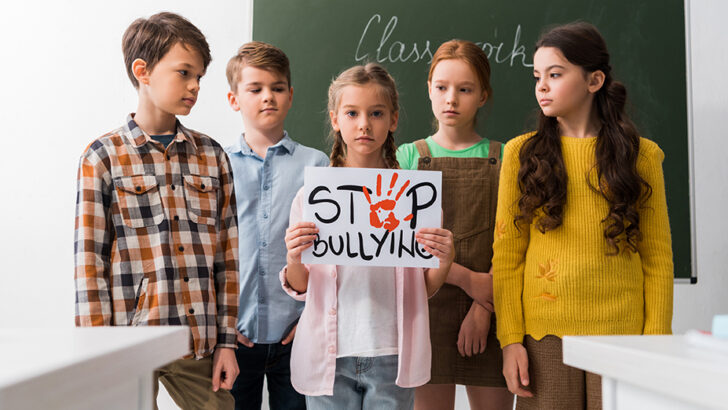This week, many parents will be breathing a sigh of relief as their little ones go back to the classroom, but for some Catholic parents, there is anxiety too. Just last weekend, in a meeting with about 2000 Italian parents and educators, Pope Francis warned Catholic educators against bullying, stating that it prepares students for war, not peace. But what happens when children are bullied in Catholic schools for – well – being Catholic?
In 2021, the Irish Times reported that the Oireachtas Committee on Education heard that students who were practising Catholics were singled out for bullying more than non-religious students. Prof James O’Higgins Norman from the DCU Anti-Bullying Centre cited a study by Amalee Meehan and Derek Laffan which found that teachers were concerned about religious students in particular, noting that these concerns echo a “growing field of research which suggests that in a rapidly secularising society (cf Norway, Sweden, UK) those who continue to practice any faith, especially the once-majority faith are vulnerable to bullying.”
Stereotyping
The report stated that when it came to the negative stereotyping of students, teachers were most concerned about those who identified as Catholic, and least concerned about those who identified as atheist. This would seem to tie in with the general cultural attitude to religion – and specifically Catholicism. There can be no doubt but that Ireland has become rapidly secularised and that there is widespread hostility to those espousing a Catholic point of view. How many times have we heard a Catholic person being ridiculed for his or her beliefs? Only last March, Michael Martin called me a “Prophet of Doom” for daring to oppose the government’s proposal to change the definition of the family and erase the words “mother” and “woman” from the Constitution. Children pick up on what they hear at home, in the media, and from those in positions of authority; if they hear adults ridiculing faith and religion and those who practice it, they will follow suit.
I have been approached by parents over the years with stories of how they or their children have had to battle it out, either with a school principal or teacher, about matter that was being taught in total contradiction to a Catholic ethos, or extracurricular “cultural” initiatives in the school that were similarly at odds with the values of a practising Catholic. I have heard stories of how parents were socially ostracised at the school gate because they had a pro-life bumper sticker on their car, or how teenage students who were reluctant to join in a dress-up celebration of “Pride” in the school were called homophobic or transphobic, despite never having shown hostility to any student or their sexual orientation.
Bullying can take different forms however. The act of bullying involves harassing, intimidating, or abusing someone, usually in a weaker position than the bully, typically with the use of name-calling, exclusion and derision. There is, however, a subtler form of bullying: institutional bullying.
Undermining
The Department of Education would appear to be fully committed to undermining the teaching of religion within Catholic schools, and consequently the undermining of Catholic parents, leaving Catholic children more vulnerable to bullying. If you doubt it, consider the following. As far back as 2011, the Forum on Patronage and Pluralism in the primary sector published its report recommending the establishment of more non-denominational schools, the divestment of schools by the Catholic Church, and the promotion of what they called “diversity” within Catholic schools. The Forum’s report recommended removing sacramental preparation from the classroom; timetabling religious instruction at the beginning or the end of the day, in order to facilitate those who do not wish to take part; requiring Catholic schools to display religious artefacts of other faiths; and the introduction of a compulsory course on Education about Religions and Beliefs (referred to as “ERB”) and ethics, parts of which are directly at odds with Catholic teaching.
In 2016, Jan O’Sullivan, then Minister for Education, abolished Rule 68 which dealt with religious instruction and ethos in primary schools.
In 2018, the Education (Admission to Schools) Act was passed, which provided that national schools established under the patronage of a particular religious group could favour children of their own denomination in their admissions policy – that is, all denominational schools, except Catholic ones. In the event of over-subscription, Catholic schools were not permitted to favour their own when in came to admissions. It was an example of blatant anti-Catholic discrimination.
The paper favours an ‘Holistic Sexuality Education Approach’ with its primary focus on ‘sexuality as a positive human potential and a source of satisfaction and pleasure’”
The National Council for Curriculum and Assessment (NCCA) is a statutory body of the Department of Education and Skills, advising the Minister. In 2017, it published a report on its proposal to establish a new ERB and Ethics course in schools. The report’s conclusion contains the immortal line: “Teaching Ethics through a faith lens is not a recommended approach for a national curriculum in Ethics.”
In 2018, the year the referendum on abortion passed, the NCCA published a paper on Relationships and Sexuality Education (RSE) in Primary and Post-Primary Irish Schools. The paper favours an “Holistic Sexuality Education Approach” with its primary focus on “sexuality as a positive human potential and a source of satisfaction and pleasure”, which “gradually equips and empowers children… to understand and enjoy their sexuality, have safe and fulfilling relationships and take responsibility for their own and others’ sexual health and well-being”. It states that “international best practice” addresses the “reality” of young people’s lives and the “diversity of sexuality and gender identities that have emerged and continue to emerge”. It expresses concern that many teachers who are timetabled to deliver Social Personal and Health Education (SPHE) or RSE classes have no qualification to do so.
In October 2024, whistleblower-teacher Mary Creedon revealed the contents of a DCU-run teacher-training course for SPHE and RSE that contained what can only be described as truly depraved sex education material, completely at odds with the Church’s teaching on human sexuality, marriage and the family. The Department of Education reportedly paid almost half a million euro for teachers to attend.
Just last month, the NCCA published a report on the consultation of the Draft Primary Curriculum Specifications. It is in the process of rewriting the Primary Curriculum, saying that it “heralds a new era in Irish curriculum reform” and that the curriculum will be “significantly different in layout, structure and content”.
Values
I think most parents, when sending their children to school, hope the ethos and general approach of the school would support the values they try to inculcate at home. I don’t think it is too much for Catholic parents to expect that their children should be entitled to express their views freely in school without being bullied, especially when those views correspond to the very ethos the school is supposed to promote. The Department’s undermining of Catholic values, ethos and the practising of the faith leads to a situation in which it becomes easier to dismiss and deride Catholic children and their parents. Both the State and the Church should make provision for the education of Catholic children in accordance with their parents’ wishes and their religious beliefs, or else, as Pope Francis warns, they may find themselves preparing for war.


 Maria Steen
Maria Steen
